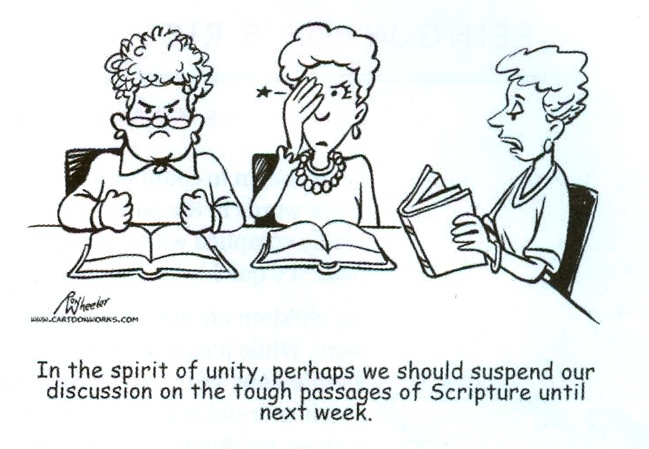Without a teaching authority or the tradition of the historic Church, this cartoon shows what many Bible studies are really like.
Save
I remember Bible Studies that started out with “What does this passage mean to you?” To keep from arguing or fighting, many just avoid difficult passages.
There are many studies that exclude Catholic ideas and comments and the reason Catholics are invited is with the hope of converting them.
What matters is this – what did author intend in the context of his own time and how has the Church understood it for 2,000 years!



This Post Has 4 Comments
For fun, try doing an “Ecumenical” bible study on Ephesians 5-6 and Genesis 1-3 and then one on how they relate.
For extra fun for Ephesians 5-6, be sure to mention marriage roles, feminism, the Church, slavery, social justice, “Paul was a man of his times”, hermenautics, etc.
Predictions: In a room of 20 people there will be 25 interpretations of each, most of which are incompatible.
Thank you! This has bothered me for years. Bible studies that are designed “for the believer to discover the meaning of the Word on his own” are a recipe for personalizing Scripture to suit one’s own purposes. And I stopped going to studies where the leader “led” by asking, “So … what do you think of this passage? How does it speak to you?” It’s rather like sitting in math class and having the teacher ask, “So … 2 + 2 … what answer resonates with you?”
Answering the question:”What did author intend in the context of his own time?” burns off the fog. History, idioms, what the Pharisees were thinking when they formed a question or an accusation… Why the Herodians existed… All of this shaped the dialogue and events in the Bible. There is a man who was studying to become a Jewish Rabbi. His studies led him to understand that Jesus is the Jewish Messiah. He had to give up his life and lifestyle in order to embrace his new found Messiah. His education gave him deep insight into the relationship between traditional Judaism and Jesus. He is like a Rosetta Stone of Jewish law, tradition and history. He is also a mathematician. He uses his skills of precision to explain how Judaism operated and how/ why Jesus responded to Jewish leadership as he did. He is not a Catholic (I dont think so anyway) but his understanding of the logic behind the conversations that Jesus engaged in with the Jews is fascinating. If interested his name is Aaron Budjen His insights can be found at Living God Ministries.
Steve,
I recently asked my neighbor, who happens to be a Baptist, if he was interested in doing a monthly bible study with me. Do you have any recommendations on a structure to follow. I would love it if we could simply begin with major topics of difference between Catholicism and Baptism. However, I’m not sure if it would be a good idea to lead with that.
Thanks!
Corey
Comments are closed.